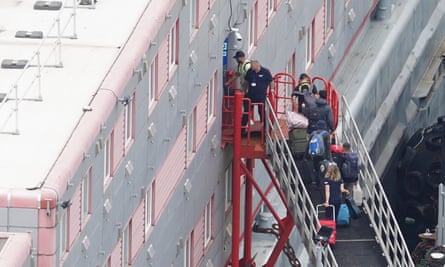The government’s controversial asylum policy faced renewed criticism on Saturday when at least six people died after a small canal crossing sank.
Two more people are still missing after the sinking, prompting fresh calls from the government to urgently introduce safe routes for asylum seekers to prevent further tragedies.
As the search for survivors continued, anger quickly turned to the Home Office’s reluctance to take measures that would deter migrants from risking their lives through the world’s busiest shipping lanes.
Tragedy also created a harrowing end to Rishi Sunak’s “Small Boat Week”, which was intended to revitalize his bumbling strategy to tackle channel crossings, but was repeatedly marred by mistakes and humiliations, including the forced evacuation of the Bibby in Stockholm and the check-in of small boats.
News of the latest tragedy emerged in the early hours of Saturday morning when a passing vessel raised the alarm that an overloaded boat was in difficulty off the coast of Sangatte near Calais.
In the hours that followed, around 65 people were rescued from the ship by the British and French coastguards. The French maritime district of the Channel and North Sea said it believed two may still be missing at sea. Of those rescued, six recovered in serious condition, and one was transported by helicopter to a hospital in Calais and later pronounced dead. The remaining five were taken to a boat, but then died.
Reports from the French lifeboats that arrived at the scene described many people at sea, many of them crying out for help.
The Dover lifeboat soon joined the rescue, with 10 survivors later seen being removed from the ship on its return to Kent, some on stretchers, although the extent of casualties and exact numbers are not clear.
Enwar Solomon, chief executive of the Refugee Council, said the recent “preventable deaths” underscored the need for the Home Office to take action.
These tragic accidents can and must be prevented. We know that people are risking their lives to cross the canal as a direct result of safe roads being very limited and inefficient.
“But instead of laying these roads in place and treating those who seek asylum with compassion and fairness, the government has introduced tough and unenforceable new laws that close our door on vulnerable men, women and children.”
“The devastating loss of life once again shows the need for a safe passage system into the UK for refugees,” said Steve Smith, chief executive of refugee charity Care4Calais.
Later, the charity Freedom from Torture released a statement accusing the ministers of “hostile” attitudes towards refugees.
The current Home Office pledges to introduce new methods, but it is unclear when and how it will do so.
“We are committed to providing ways, including exploring new ones, to reach safety for vulnerable people around the world, but first we must control the increase in illegal immigration and stop the boats,” says the Home Office. website.
In the aftermath of Saturday’s tragedy, a statement from the Home Office focused on dealing with people smugglers rather than revising its current approach. “This incident unfortunately is yet another reminder of the extreme dangers of crossing the canal in small boats and how important it is to break the business model of people smugglers and stop the boats,” the statement read.
Interior Minister Soella Braverman chaired a meeting with Border Force officials on Saturday morning, describing the incident as a “tragic loss of life”.
After promoting the newsletter
In France, the Boulogne public prosecutor’s office opened an investigation.
A member of the French National Assembly for Calais, Pierre-Henri Dumont, said authorities were interviewing migrants who were able to speak and were unwell, to determine what happened and where they came from.
Rescuers were still searching the water Saturday night for survivors and bodies. French naval aircraft and a helicopter were deployed to assist in the search.
On Thursday, 755 people crossed the English Channel in small boats, the highest daily number so far this year, bringing the total since 2018 to more than 100,000.
Rescue teams said this was the seventh time last week that they had to pull people out of the water.

Although the accident occurred on French territory, it was only natural that the British and French rescue teams worked together to save as many people as possible.
The sinking came a day after fresh humiliation for the Home Office when asylum seekers were evacuated on the Bibby barge in Stockholm after Legionella bacteria were discovered in the water supply.
The worst shipwreck involving migrants occurred in November 2021 when at least 27 people died after a dinghy sank while on their way to the UK from France. Four people died at sea trying to cross in December.
The Home Office’s position on safe and legal routes also states: “As provided by the Illegal Immigration Act, an annual number of persons arriving via safe and legal routes will be determined by Parliament and in consultation with local authorities.”